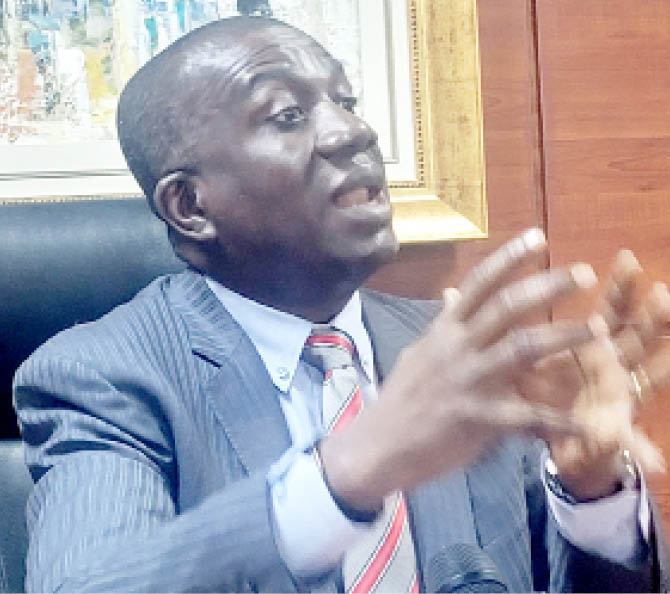The Managing Director of the Development Bank of Nigeria, Tony Okpanachi, met with select editors on the back of the banks’ recent accreditation by the GCF. He spoke on a number of issues and how a new vista of opportunities has been opened for Nigerian businesses.
What does the recent accreditation by the GCF mean for Nigeria and why the excitement?
DBN has been accredited under the Medium Category which means it can access GCF’s funding for projects between $50million and $250million.
DBN has also been accredited for on-lending, blending for loans and project management only, which means at this stage, DBN cannot access grant funding, equity and guarantee instruments from GCF.
However, plans are underway to seek an upgrade to include these instruments in the future.
- Teaching board: 62,000 Oyo applicants jostle for 10,500 slots
- Protest: Police deploy 4,200 men, vows to resist violence in FCT
GCF funds will be administered on a concessionary rate basis through a structure that will involve close collaboration with the NCCC for project selection, appraisals and alignment with the Nigeria NDC’s. Shortlisted projects will then require detailed funding proposals that will be sent to the GCF for approval.
GCF’s resources can only be used for climate mitigation and adaptation projects which must be aligned with Nigeria’s NDC focus areas.
Given the significant role of MSMEs in Nigeria’s economy, how has the Development Bank been able to bridge the financing gap for these businesses, particularly in underserved sectors and regions?
The bank has particularly focused on underserved segments and regions by channelling significant resources to women-owned and youth-owned businesses.
DBN also remains unwavering in its support for women-owned MSMEs, recognising the unique challenges they face in accessing financial and business development services.
DBN’s commitment to supporting women entrepreneurs was acknowledged with an honorable mention at the 2022 Global SME Finance Awards.
Similarly, DBN has directed efforts towards empowering the youth, who constitute approximately 70% of Nigeria’s population and are the nation’s greatest assets.
Innovation remains at the core of DBN’s operations, which is why the bank has introduced innovative products such as longer-tenured loans and the Finance2Finance product, which facilitates funding for financial institutions which have active MSME portfolios but are unable to receive direct funding from DBN.
The DBN recently achieved an AAA rating from GCR and other favourable ratings from other agencies. What has informed this creditworthiness?
DBN’s exceptional creditworthiness can be attributed to several strategies, some of which is include:
Robust Risk Management: DBN has implemented comprehensive risk management frameworks that ensure the quality and safety of our loan portfolios.
Strong Financial Performance: Consistent financial performance, including DBN’s ability to maintain high levels of liquidity and profitability, has been crucial.
Operational Excellence: DBN’s focus on operational efficiencies, including the use of technology and streamlined processes, has enhanced the bank’s service delivery.
Strategic Partnerships: Collaborations with reputable financial institutions, consultants and development partners have bolstered our credibility and financial strength.
How has the DBN leveraged its partnership with financial intermediaries to expand its reach?
One of the merits of DBMs’ wholesale model is the advantage it provides the bank to leverage the extensive and vast network of its PFIs to reach MSMEs dispersed across the country.
Hence the bank has strategically partnered with over 69 PFIs across commercial banks, micro-finance banks and other financial institutions as at the end of 2023. Strategies are in place to partner with more PFIs within the financial sectors to disburse loans more effectively.
Challenges such as limited financial literacy among MSMEs and the varying capabilities of PFIs have been addressed through targeted training programmes and continuous technical assistance support.
One of DBN’s mandates revolves around providing Technical-Assistance to PFIs, enhancing their capability and willingness to lend to MSMEs.
Through strategic partnerships with organisations such as Google Nigeria and the Entrepreneurship Development Centre (EDC) of the Lagos Business School, DBN has facilitated capacity-building programmes for Nigerian MSMEs to enable these businesses to become financially viable.
Additionally, with the introduction of a Learning Management System, DBN has equipped over 5,000 MSMEs as of December 2023 with the necessary knowledge and skills to overcome financing challenges and pursue growth aspirations.
How are you dealing with the high cost of borrowing?
We recognise the difficulties businesses face in this challenging economic landscape, and this has indeed increased our resolve as an institution to accelerate and catalyse access to finance for MSMEs.
Consequently, the bank has an interest drawback programme that incentivises the PFIs to on-lend to businesses in key impact segments and sectors of the economy.
Furthermore, there is a close relationship between cost of capital and risk perception.
Hence reducing both the inherent and perceived risk in the MSME sector will go a long way in reducing the cost of capital. To this end, the bank has a robust capacity-building programme developed to enhance the capacity of MSMEs to thrive and become fund-ready, thereby unlocking more affordable financing.
How does the DBN measure its impact on job creation, economic growth, and poverty reduction?
DBN’s impact target is to support Nigeria’s economic transformation and sustainable socioeconomic growth through financial and non-financial support mechanisms to enable a vibrant, diverse, and growing MSME sector. One of the most tangible impacts of increased MSME financing is job creation. As of December 2023, DBN’s activities had also resulted in the creation of about 1.2 million jobs.
DBN assesses the impact of its initiatives across three levels: at the ecosystem level, at the Participating Financial Institution (PFI) level, and at the MSME level.
At the ecosystem level, DBN’s impact target will improve investor confidence to support MSMEs, leading to new investors and sources of capital in the ecosystem, alongside a variety of fit-for-purpose funding models and supportive regulations and policies.
Indicators of this include the percentage of DBN’s loan book funded through new investors and the number of MSME finance policies or regulatory instruments drafted with DBN input.
At the PFI level, DBN’s impact target is to equip PFIs with an improved understanding of the MSME sector, thereby enabling them to become better positioned to provide appropriate products and services to the MSME sector. DBN measures this through indicators such as the number of PFIs reporting an increased understanding of the MSME sector and an increased ability or willingness to lend to MSMEs due to DBN loans, guarantees, and capacity building.
At the MSME level, key metrics include the percentages, volume, and count of loans disaggregated by gender, youth, sector, and geography. Over the next 5 years, in line with the new strategic direction of the bank, DBN targets disbursing 30% of loans outstanding to youth-led MSMEs, 40% to women-led MSMEs, and 15% to MSMEs in underdeveloped geopolitical zones/focus states.
What are the DBN’s expansion plans, both in terms of geographic reach and product offerings?
DBN has firmly established itself as the primary development bank supporting MSMEs in Nigeria.
With the recent launch of a new 5-year strategic plan, DBN aims to accelerate its impact and reach over 2 million MSMEs, reflecting the bank’s commitment to scaling its efforts and driving sustainable growth in the Nigerian market.
Our plan is to expand its geographic reach by increasing its presence in underserved regions, particularly in the North East and North West.
We are also broadening our product offerings to include more tailored financial solutions, for impact segments such as green, youth and gender-based financing, collaborating with more financial intermediaries and leveraging technology to scale its impact over its new strategic cycle.

 Join Daily Trust WhatsApp Community For Quick Access To News and Happenings Around You.
Join Daily Trust WhatsApp Community For Quick Access To News and Happenings Around You.


